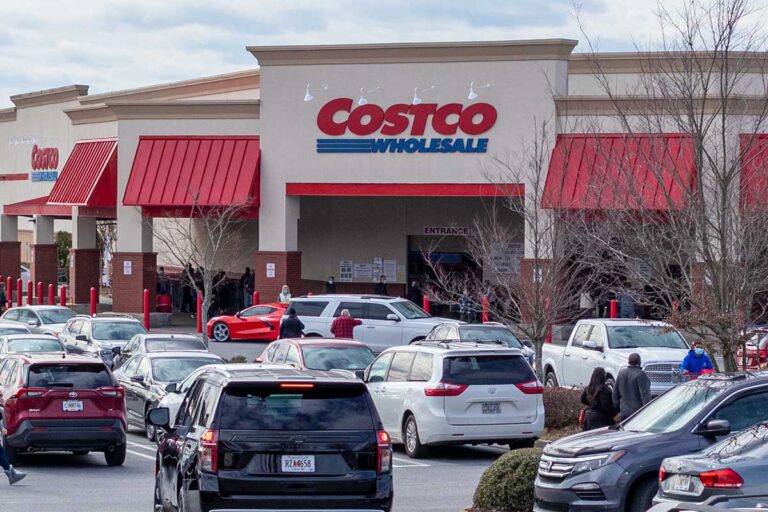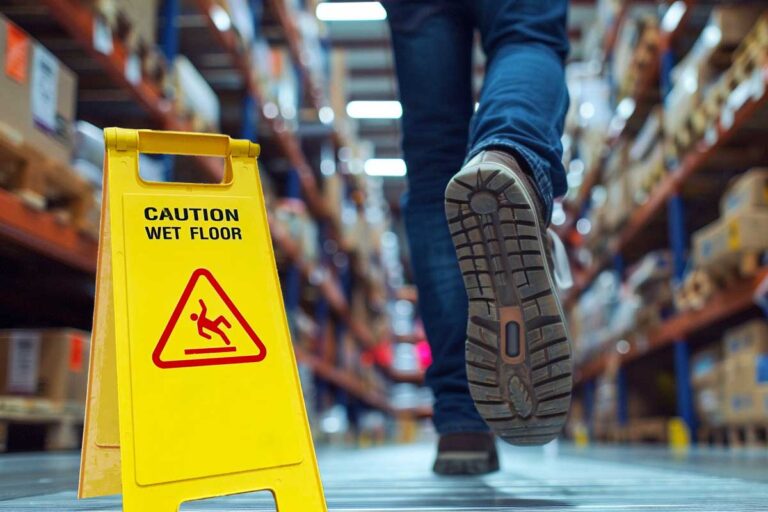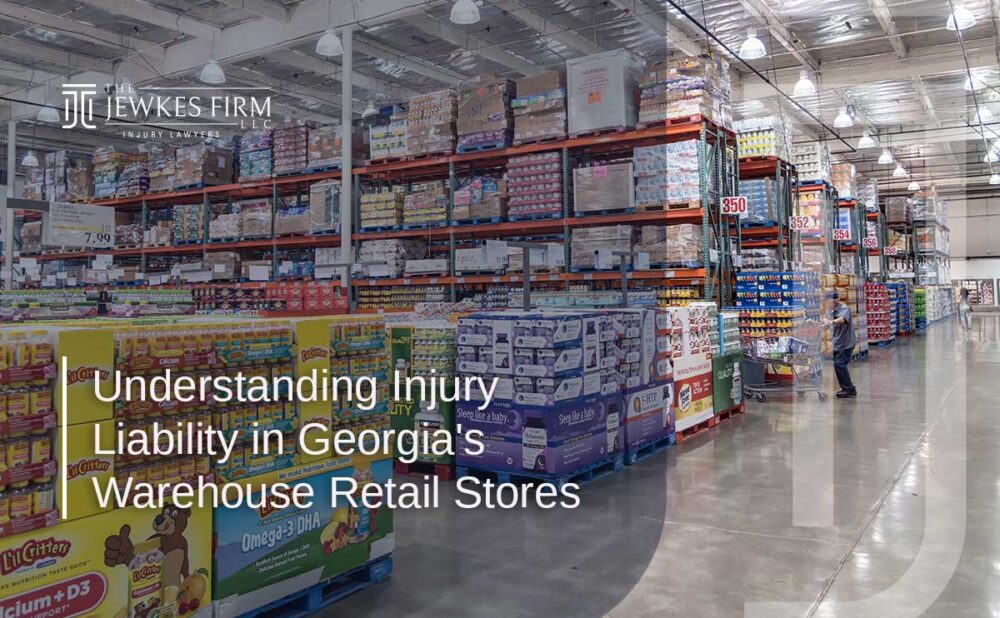Understanding Injury Liability in Georgia’s Warehouse Retail Stores
Shopping at warehouse retail stores, such as Costco, Sam’s Club, and BJ’s Wholesale Club, can be a convenient and enjoyable experience, but accidents can occur, leading to injuries on the premises. Understanding injury liability—the legal responsibility a party has when someone is injured on their premises—is crucial for both customers and retailers alike. When an accident happens, questions surrounding who is responsible and what compensation may be available often arise.
Injury liability encompasses various scenarios where harm can occur, from slips and falls to more severe accidents involving equipment. For large warehouse-style stores frequented by thousands of customers each day, the potential for accidents is significant. Therefore, shoppers must stay informed about their rights and the company’s obligations regarding safety.
In Georgia, the legal framework governing these liabilities plays a vital role in determining accountability. It is essential for both parties to be aware of the laws and regulations that dictate how liability is assessed and what measures can be taken to prevent accidents. This comprehension not only protects consumers from potential harm but also shields retailers from legal repercussions that may arise from accidents.
As we delve deeper into the intricacies of injury liability in warehouse retail settings, we will explore common causes of injuries, the legal responsibilities of retailers, and the necessary steps to take when an injury occurs.
By understanding these elements, customers can navigate the complexities of injury claims in Georgia’s warehouse retail landscape.
Injured In A Premises Liability Accident? Contact Us For A Free Consultation
Injured In A Premises Liability Accident?

Injury Liability in Warehouse Retail Stores
In the context of warehouse retail stores, understanding injury liability is crucial for both shoppers and retailers. This section will delve into the legal frameworks surrounding liability, the rights of shoppers if an injury occurs, and the processes involved in seeking compensation through insurance claims.
Legal Responsibilities of Warehouse Retail Stores
Warehouse retail stores in Georgia, like all businesses that welcome the public, have a legal obligation to maintain a safe shopping environment for their customerss. This “duty of care” includes regularly inspecting the premises for hazards, addressing maintenance issues promptly, and training employees to handle potential dangers. If a shopper suffers an injury due to negligence—such as a wet floor unmarked by warning signs or malfunctioning equipment—the retailer may be held liable for damages. The specifics of liability can vary. But, generally, retailers must uphold certain safety standards and take proactive measures to prevent accidents.
Rights of Shoppers in Case of Injury
When a shopper is injured on a retailer’s premises, they have specific rights that protect them. First and foremost, shoppers are entitled to seek medical assistance for their injuries. Additionally, they have the right to report the incident to store management and request an incident report. This report is crucial for any future claims. In many jurisdictions, if a shopper can demonstrate that the retailer’s negligence directly contributed to their injury, they may be eligible for compensation covering medical expenses, lost wages, and pain and suffering. Understanding these rights is essential for shoppers. Thus, empowering them to take appropriate action following an incident.
Insurance Claims and Compensation
Navigating the insurance claims process can be daunting for shoppers injured in warehouse retail stores. After an incident, it is advisable to document everything—taking photos of the scene, collecting witness statements, and keeping records of medical treatments. This documentation will be vital when filing a claim with the retailer’s insurance provider. Shoppers should also be aware that insurance companies often seek to minimize payouts. Thus, leading to underwhelming compensation offers. Consulting with a personal injury attorney at The Jewkes Law Firm may be beneficial. Our team helps negotiate a fair settlement and ensures that your rights are protected throughout the process. Understanding the intricacies of insurance claims can significantly impact the outcome for those injured at warehouse retail locations.
By being informed about the legal responsibilities retailers hold and the rights of shoppers, consumers can better navigate the complexities of injury liability and seek the compensation they deserve in the event of an accident.

GEORGIA PERSONAL INJURY LAWYER NEAR ME
Common Causes of Injuries in Warehouse Retail Stores
Warehouse retail stores, characterized by their vast open spaces and high-volume inventory, can present unique hazards to customers. Understanding the common causes of injuries in these environments is crucial for both shoppers and retailers alike. Here are some of the most frequent causes of injuries in warehouse retail stores:
Slips and Falls Due to Wet or Uneven Surfaces
One of the most prevalent types of injuries in warehouse retail stores is slips and falls. These incidents often occur due to wet or uneven surfaces caused by spills, leaks, or inadequate flooring maintenance. When liquids are not promptly cleaned, or when flooring materials become worn and uneven, the risk of slipping increases significantly. Customers may not be aware of potential hazards and could easily lose their footing, resulting in serious injuries such as fractures, sprains, or head trauma.
Injuries from Falling Merchandise
Another common source of injury in warehouse retail environments is the risk of falling merchandise. With tall shelving units and heavy items stacked high, there is a possibility that products may become dislodged and fall onto unsuspecting customers. This can occur due to improper stacking, failure to secure items, or customer interference. Injuries from falling merchandise can range from minor bruises to more severe injuries, including concussions or broken bones. Thus, making it essential for retailers to implement strict safety measures.
Accidents Involving Equipment Such as Forklifts
Warehouse retail stores often utilize equipment such as forklifts to move large quantities of merchandise. While these machines are essential for efficient operations, they also pose significant risks if not operated correctly. Accidents can occur due to operator error, inadequate training, or lack of safety protocols. Customers may be at risk if they are in close proximity to moving equipment, leading to potential collisions or other dangerous situations. Ensuring that operators are well-trained and that safety guidelines are strictly followed is essential to minimizing these risks.
In summary, the common causes of injuries in warehouse retail stores primarily stem from environmental hazards, issues related to merchandise handling, and equipment operations. By being aware of these potential dangers, customers can take proactive steps to protect themselves. And, retailers can implement necessary precautions to create a safer shopping experience.

Steps to Take After an Injury Occurs
In the unfortunate event that an injury occurs within a warehouse retail store, it is crucial for both customers and retailers to understand the necessary steps to protect their rights and ensure proper documentation of the incident. Here are the key actions to consider following an injury:
Reporting the Incident to Store Management
The first step after sustaining an injury is to report the incident to store management immediately. This not only ensures that management is aware of the situation but also initiates the store’s internal procedures for handling such events. A timely report allows management to address any immediate safety concerns and possibly prevent further injuries. It is important for customers to provide a clear and concise account of what happened, including the specific location and circumstances of the injury.
Documenting the Scene and Collecting Evidence
Once the incident has been reported, it is vital to gather as much evidence as possible. This can include taking photographs of the scene, particularly the area where the injury occurred, as well as any relevant conditions such as spills, obstacles, or safety hazards. Additionally, obtaining contact information for any witnesses can be beneficial, as their accounts may support the injured party’s claim. If feasible, customers should also keep records of any medical treatment received following the injury, including doctor visits, prescriptions, and any other related expenses.
Consulting a Legal Professional for Guidance
After addressing immediate safety concerns and documenting the incident, it is advisable for the injured party to consult a legal professional specializing in personal injury law. A knowledgeable attorney can provide guidance on the legal rights and options available, including potential compensation for medical expenses, lost wages, and pain and suffering. Understanding the intricacies of injury liability in Georgia is essential. The laws and regulations can vary significantly from one jurisdiction to another. Engaging a legal expert early in the process can help ensure that the injured party’s interests are adequately represented.
By taking these steps, individuals involved in an injury at a warehouse retail store can better safeguard their rights and enhance their chances of receiving fair treatment and compensation.
Legal Recourse for Injured Parties
When an injury occurs at a warehouse retail store, understanding the available legal recourse is crucial for affected individuals seeking compensation. The pathway to obtaining justice and financial restitution can be complex. Staying informed about the steps involved can significantly aid in navigating the process.
Filing a Claim Against Warehouse Giants
The initial step for an injured party is to file a claim. This process typically begins with notifying the respective warehouse location’s management about the incident and the resulting injuries. It is advisable to document the details of the incident thoroughly. This includes photographs of the scene, witness statements, and any medical records pertaining to the injury.
Warehouse stores typically have a dedicated claims department that handles injury claims. Thus, it is essential to follow their procedural guidelines. The injured party may need to complete specific forms or provide detailed accounts of the incident. Additionally, it’s important to understand that there may be a statute of limitations governing how long an individual has to file a claim.
Understanding the Role of Legal Counsel
Engaging a specialized premises liability attorney can significantly enhance an injured party’s chances of a successful outcome. Legal counsel can provide invaluable assistance in several ways. They can help interpret the complexities of liability laws, negotiate with the retailer’s insurance representatives, and ensure that all required documentation is properly submitted.
An experienced attorney will also be able to assess the strength of the claim and provide advice on the potential for success based on the specifics of the incident. Their expertise can be particularly beneficial when it comes to calculating damages, which may include medical expenses, lost wages, pain and suffering, and any other costs incurred as a result of the injury.
Potential Outcomes of Injury Claims
The outcomes of injury claims against warehouse stores can vary widely based on the circumstances of each case. If the parties resolve a claim amicably, they may reach a settlement agreement in which the warehouse retailer compensates the injured party without admitting liability. This route can save both parties time and legal expenses, allowing the injured individual to receive compensation more quickly.
If the parties cannot reach a settlement, the injured party may need to pursue litigation. A court trial may occur, with evidence presented and a judge or jury determining liability and damages. The possibility of winning a court case can depend on various factors, including the clarity of the evidence, witness credibility, and the prevailing laws in the jurisdiction.
Ultimately, while the legal recourse for injured parties at warehouse retail stores can be intricate, understanding the claim process, the benefits of legal counsel, and the potential outcomes can empower individuals to make informed decisions and secure the compensation they deserve.

Stay Informed and Vigilant at Warehouse Stores
In navigating the complexities of injury liability at warehouse retail stores in Georgia, it is crucial for both customers and retailers to be well-informed about their rights and responsibilities. Understanding injury liability not only protects customers from potential hazards but also helps retailers mitigate risks and maintain a safe shopping environment.
Understanding the nuances of injury liability cannot be overstated. Customers must be aware of their surroundings and the potential dangers that exist within warehouse retail settings. Retailers have a legal and ethical obligation to ensure the safety of their premises. This includes adhering to safety protocols, maintaining equipment, and adequately training staff to handle various situations that may arise.
For injured parties, legal recourse is available. The claims process is complicated. Engaging with legal counsel can provide valuable guidance and increase the chances of a favorable outcome. Each case is unique. The potential outcomes of injury claims can vary widely based on the specific circumstances surrounding the incident.
While accidents can happen anywhere, understanding the nuances of injury liability at warehouse retail stores, such as Costco, Sam’s Club, and BJ’s Wholesale Club, empowers consumers to make informed decisions should an unfortunate event occur. Navigating injury liability in warehouse retail stores involves understanding the legal framework, recognizing common causes of injuries, and knowing the appropriate steps to take when an incident occurs. By remaining informed and vigilant, both customers and retailers can effectively manage the complexities of liability. Thus, leading to a safer and more enjoyable shopping experience for everyone involved. Get in touch with The Jewkes Firm today at (770) 771-5130 for a no-cost consultation on your injury case!





